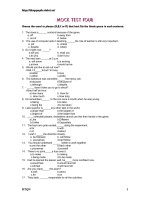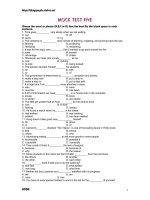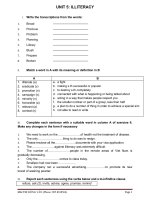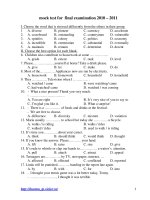MOCK TEST 170
Bạn đang xem bản rút gọn của tài liệu. Xem và tải ngay bản đầy đủ của tài liệu tại đây (57.97 KB, 3 trang )
SƠ GD&ĐT VINH PHUC
TRƯƠNG THPT LIÊN SƠN
(Đề thi gồm: 04 trang)
ĐỀ KTCL ƠN THI THPT QUỐC GIA NĂM 20182019
Mơn: TIẾNG ANH – ĐÊ SỐ 170
Thời gian làm bài: 60 phút, không kể thời gian phát
đề
Ho và tên thi sinh:……………………………………………………………………. SBD:…………………………
Choose the word whose underlined part is pronounced differently from that of the others.
Question 1: A. honest
B. home
C. vehicles
D. heiress
Question 2: A. books
B. carrots
C. floors
D. slopes
Mark the letter A, B, C or D on your answer sheet to indicate the word that differs from the
rest in the position of the main stress in each of the following word.
Question 3: A. company
B. atmosphere
C. customer
D. employment
Question 4: A. institution
B. university
C. preferential
D. indicative
Question 5: A. environment
B. difficulty
C. community
D. inhabitant
Mark the letter A, B, C, or D on your answer sheet to indicate the word that is CLOSEST in
meaning to the underlined part in each of the following questions.
Question 6: In most countries, compulsory military service does not apply to women.
A. superior
B. mandatory
C. beneficial
D. constructive
Question 7: The kidnapper gave himself up to the authorities.
A. surrendered
B. confided himself C. went up
D. accommodated himself
Question 8: The famous racehorse Secretariat had to be destroyed because of a painful, incurable
hoof disease.
A. irreparable
B. vexatious
C. dangerous
D. disabling
Mark the letter A, B, C, or D to indicate the word or phrase that is OPPOSITE in meaning to the
italic part in each of the following questions.
Question 9: The earth is being threatened and the future looks bad.
A. done
B. made
C. defended
D. varied
Question 10: Thousands of people are going starving because of the flood.
A. hungry
B. poor
C. rich
D. full
Mark the letter A, B, C, or D on your answer sheet to indicate the underlined part that needs
correction in each of the following questions.
Question 11: If there’s a more funnier person in the world than him, I don’t know who it will be.
A. there's
B. more funnier
C. than
D. will
Question 12: From the driver’s point of view, the new speed limits enacted by the state were
more stricter than the old laws.
A. From
B. speed limits
C. more
D. than the old laws
Question 13: Someone who use a personal computer to perform only such tasks as word
processing and sending e-mail need not buy the most advanced model available on the market.
A. who use
B. such tasks as
C. need not
D. on
Question 14: The bridge-building project had problems with funding right from the work begins.
A. bridge-building B. had problems
C. with
D. begins
Question 15: Could you mind telling me the way to the nearest restaurant?
A. Could
B. telling me
C. to
D. nearest
Mark the letter A, B, c, or D on your answer sheet to indicate the correct answer to each of the
following questions.
Question 16: Because of his poor health, it took him a long time to________ his bad cold.
A. throw over B. throw off
C. throw away
D. throw down
Question 17: The hut________ is said to be haunted.
A. at the foot of the hill
B. in the foot of the hill
C. by the foot of the hill
D. with the foot of the hill
Question 18: Mrs. Brown had her bicycle________ yesterday.
A. repairing
B. repair
C. repaired D. be repaired
Question 19: They might have told us the way________ we hadn't left in such a hurry way.
A. or
B. unless
C. when
D. if
Question 20: ~ Anna: "________________ "
~ Bob: "I 'm glad you enjoyed it. Hope to see you again soon."
A. That’s a great dinner. Thanks a lot. You'll have to come to our place sometime.
B. My uncle is coming soon. Would you like to come to our dinner?
C. I highly appreciate for the houses you've rebuilt for our village.
D. I don’t mind going to the party sometimes but when I know everybody there then I enjoy
it.
Question 21: The pay was not brilliant but I could________ and there were many aspects of the job
that I enjoyed.
A. earn high salary B. do a living
C. get high salary
D. make a living
Question 22: ~ Linda: "What kinds of music do you like, Mary?" ~ Mary: "______________ "
A. You really guess so.
B. Well, I guess I'm really into jazz.
C. Hmm, no, I don't really like Westerns. D. Concert
Question 23: ~ Peter: "Could you fill it up, please? ~ Ivan: "________ "
A. Where? Of course not.
B. Not at all. I’ll fill the oil for you.
C. Sure. Shall I check the oil as well?
D. Certainly. My job is to fill in the application.
Question 24: The university’s programs________ those of Harvard.
A. are second only to
B. come second after
C. are in second place from
D. are first except for
Question 25: It was________ that we decided to stay indoors.
A. such a hot day
B. so a hot day
C. so a day hot
D. such a day hot
Read the following passage and mark the letter A, B, C, or D on your answer sheet to indicate
the correct word for each of the blanks.
Researchers in communication show that more feelings and intentions are (31)________ and
received non-verbally than verbally. Mehrabian and Wiener following have stated that only 7%
(32)________ message is sent through words, with remaining 93% sent non-verbal (33)________
Humans use non-verbal communication because:
Words have limitations: There are (34)________ areas where non-verbal communication is
more (35)________ than verbal, especially when we explain the shape, directions, personalities
which are expressed non-verbally.
Non-verbal signal are powerful: Non-verbal cues primarily express inner (36)________ while
verbal messages deal basically with outside world.
Non-verbal message are likely (37)________ more genuine: because non-verbal behaviours
cannot be controlled as easily as spoken words.
Non-verbal signals can express feelings inappropriate to state: Social etiquette limits
(38)________ can be said, but non-verbal cues can communicate thoughts. A separate
communication channel is necessary to (39)________ send complex messages:
A speaker can add enormously to the complexity of the verbal message through simple
non-verbal (40)________.
Question 31: A. sent
B. posted
C. mailed
D. thrown
Question 32: A. through
B. in
C. of
D. for
Question 33: A. thought
B. expressions
C. gestures
D. postures
Question 34: A. sum
B. great deal
C. amount
D. numerous
Question 35: A. effect
B. effective
C. effectively
D. effectiveness
Question 36: A. feelings
B. words
C. shows
D. sorrows
Question 37: A. be
B. being
C. to be
D. been
Question 38: A. what
B. that
C. why
D. when
Question 39: A. get
B. have
C. make
D. help
Question 40: A. signs
B. signals
C. sight
D. signatures
Read the following passage and mark the letter A, B, C or D on your answer sheet to indicate
the correct answer to each of the following questions.
When something terrible happens, such as an earthquake or a flood, people need help. At
these times, they work together in groups. On January 17 th, 1995, a powerful earthquake hit the
city of Kobe, Japan. Many buildings burned or collapsed. Part of an expressway fell over. Train lines
were damaged, and supplies of electricity, gas, and water were cut off. Soon after the earthquake
was over, people in Kobe began working together to save their city. Neighbours pull each other out
of collapsed buildings. Ordinary people put out fires even before the fire trucks arrived.
Volunteers in Kobe organized themselves into teams. They worked out a system to send
help to where it was needed. Some people brought food, water, clothes, and electric generators to
different parts of the city. Other teams search for belongings in damaged stores and homes. Some
volunteers took care of children who had lost their parents. Teams of volunteers from outside
Japan helped, too. A rescue team with search dogs came from Switzerland. A group of doctors,
called Doctors Without Borders, came from all over the world. A group called the International
Rescue Corps also sent its members to help. Today, Kobe has been rebuilt. But people there still
remember the outpouring of support they received from all over the world back in 1995.
Question 41: In 1995, Kobe was hit by_________.
A. a storm
B. a flood
C. an earthquake
D. a volcano
Question 42: The story does not say so, but it makes you think that_________.
A. the earthquake destroyed all of the cities in Japan B. many people were hurt the earthquake
C. people no longer live in Kobe
D. many firefighters died in the earthquake
Question 43: The doctors in Doctors Without Borders_________.
A. all came from Switzerland
B. came from all over the world
C. used search dogs to help them
D. also worked for the International Rescue Corps
Question 44: Which of the statements below does the story lead you to believe?
A. Strong earthquakes happen only in Japan. B. Earthquakes are extremely dangerous.
C. It is easy to fix the damage caused by a strong earthquake.
D. Only volunteers can fix the damage caused by a strong earthquake.
Question 45: On the whole, the story is about_________.
A. an earthquake in Kobe, Japan
B. the roads and trains in Kobe, Japan
C. how to organize volunteers
D. international volunteers' activities in Japan
Mark the letter A, B, C, or D on your answer sheet to indicate the sentence that is SIMILAR in
meaning to the one given italicized one.
Question 46: He cannot practise scuba diving because he has a weak heart.
A. The reason why he cannot practise scuba diving is that he has a weak heart.
B. The fact that he has a weak heart cannot stop him practicing scuba diving,
C. Scuba diving makes him suffer from having a weak heart.
D. He has a weak heart but he continues to practise scuba diving.
Question 47: The test we did last time was more difficult than this one.
A. This time we have to do the most difficult test of all.
B. We did an easy test last time and a difficult one this time.
C. This test is not as difficult as the one we did last time.
D. The test we have done this time is not difficult at all.
Question 48: People believe that neither side wanted war.
A. Neither side is responsible for the outbreak of war.
B. War is believed to be wanted by either side.
C. Neither side is believed to have wanted war.
D. It is believed that war broke out from both sides.
Question 49: She asked John to repeat what he had said.
A. "Please repeat what you said, John," she said.
B. "You have to repeat what you say, John," she said,
C. "Will you please repeat what John said?" she asked.
D. "Please repeat what you said to John," she said.
Question 50: “No, it’s not true. I didn't steal the money!" Jean said.
A. Jean denied having stolen the money.
B. Jean admitted stealing the money,
C. Jean refused to steal the money.
D. Jean did not intend to steal the money.
_______THE END______









